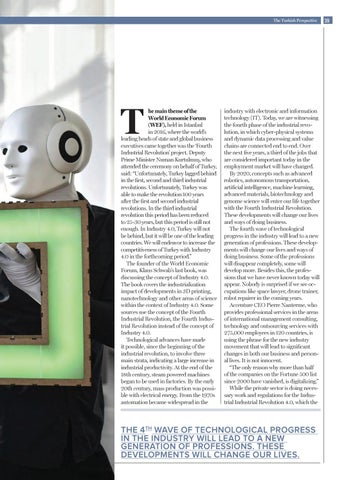The Turkish Perspective
T
he main theme of the World Economic Forum (WEF), held in Istanbul in 2016, where the world’s leading heads of state and global business executives came together was the ‘Fourth Industrial Revolution’ project. Deputy Prime Minister Numan Kurtulmuş, who attended the ceremony on behalf of Turkey, said: “Unfortunately, Turkey lagged behind in the first, second and third industrial revolutions. Unfortunately, Turkey was able to make the revolution 100 years after the first and second industrial revolutions. In the third industrial revolution this period has been reduced to 25-30 years, but this period is still not enough. In Industry 4.0, Turkey will not be behind, but it will be one of the leading countries. We will endeavor to increase the competitiveness of Turkey with Industry 4.0 in the forthcoming period.” The founder of the World Economic Forum, Klaus Schwab’s last book, was discussing the concept of Industry 4.0. The book covers the industrialization impact of developments in 3D printing, nanotechnology and other areas of science within the context of Industry 4.0. Some sources use the concept of the Fourth Industrial Revolution, the Fourth Industrial Revolution instead of the concept of Industry 4.0. Technological advances have made it possible, since the beginning of the industrial revolution, to involve three main strata, indicating a large increase in industrial productivity. At the end of the 18th century, steam powered machines began to be used in factories. By the early 20th century, mass production was possible with electrical energy. From the 1970s automation became widespread in the
industry with electronic and information technology (IT). Today, we are witnessing the fourth phase of the industrial revolution, in which cyber-physical systems and dynamic data processing and value chains are connected end to end. Over the next five years, a third of the jobs that are considered important today in the employment market will have changed. By 2020, concepts such as advanced robotics, autonomous transportation, artificial intelligence, machine learning, advanced materials, biotechnology and genome science will enter our life together with the Fourth Industrial Revolution. These developments will change our lives and ways of doing business. The fourth wave of technological progress in the industry will lead to a new generation of professions. These developments will change our lives and ways of doing business. Some of the professions will disappear completely, some will develop more. Besides this, the professions that we have never known today will appear. Nobody is surprised if we see occupations like space lawyer, drone trainer, robot repairer in the coming years. Accenture CEO Pierre Nanterme, who provides professional services in the areas of international management consulting, technology and outsourcing services with 275,000 employees in 120 countries, is using the phrase for the new industry movement that will lead to significant changes in both our business and personal lives. It is not innocent. “The only reason why more than half of the companies on the Fortune 500 list since 2000 have vanished, is digitalizing.” While the private sector is doing necessary work and regulations for the Industrial Industrial Revolution 4.0, which the
The 4th wave of technological progress in the industry will lead to a new generation of professions. These developments will change our lives.
39
